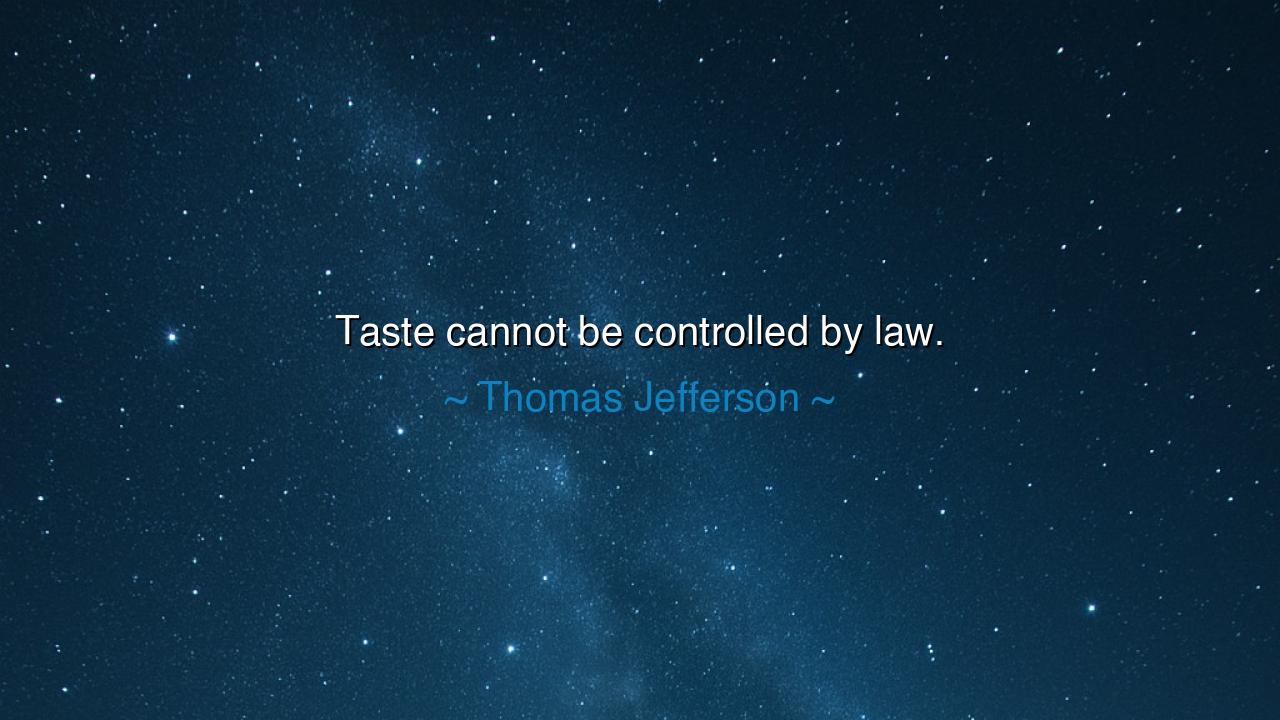
Taste cannot be controlled by law.






The words of Thomas Jefferson, “Taste cannot be controlled by law,” flow with the clarity of a mountain stream and the firmness of a truth carved into the heart of humanity. In this brief yet mighty phrase, Jefferson declares that while the law may govern our actions, it can never rule over the hidden chambers of the soul—our preferences, our loves, our sense of beauty and harmony. He speaks as a statesman, a philosopher, and a man of the Enlightenment, warning future generations that legislation may bind behavior, but never desire; it may command silence, but never compel admiration.
The origin of this saying lies in Jefferson’s reflections on liberty and human nature. A drafter of the Declaration of Independence and an architect of republican ideals, Jefferson was deeply concerned with the limits of government. To him, the true strength of a free people rested in the recognition that some domains belong forever to the individual alone. Taste—whether in art, music, literature, or the customs of daily life—was such a realm. No lawmaker could decree what is beautiful, no judge could legislate what should inspire delight, and no king could compel the heart to rejoice in what it rejects.
History offers us proof in the age of Soviet art under Stalin. The state demanded “socialist realism,” decreeing that only works glorifying the worker, the Party, and the state could be considered legitimate art. Painters, poets, composers, and writers were forced into this mold. Yet despite decades of enforcement, the hearts of the people clung secretly to other forms—folk songs, hidden manuscripts, forbidden books passed hand to hand. When tyranny fell, it was revealed that taste, suppressed but never extinguished, had survived in secret. Thus Jefferson’s truth stood unbroken: the law may silence, but it cannot control the spirit’s sense of beauty.
The deeper meaning of Jefferson’s words is also a defense of freedom itself. For if the law cannot rule over taste, then the state has no business trying. To legislate aesthetics is to attempt the impossible, and worse, to trespass into the sanctuary of personal liberty. The preference for one melody over another, one book over another, one custom over another—these belong to the individual conscience, as sacred as belief itself. Jefferson knew that the attempt to control such matters leads only to oppression, resentment, and the decay of true culture.
Yet his saying also contains a gentle lesson: that in matters of taste, diversity must be allowed to flourish. One man may cherish the soaring strains of Beethoven, while another finds joy in the humblest folk song. One woman may delight in marble palaces, another in the simplicity of a cottage garden. To force one standard upon all is folly; to allow many standards is freedom. In this way, taste becomes not only a matter of private joy, but a reflection of the richness of human society.
The lesson for us is clear: resist the temptation to demand conformity in matters of preference. Do not scorn the tastes of others, nor seek to enshrine your own as universal law. Instead, cultivate your own sense of beauty with honesty and courage, while respecting that others may walk a different path. Just as we expect liberty for our own spirit, so must we grant liberty to the spirits of others. Taste is the garden of individuality; let each person tend it in their own way.
Therefore, let us live as Jefferson counseled: honoring the limits of law, while defending the infinite horizons of personal liberty. Governments may rightly regulate safety, property, and justice, but the human soul must remain beyond their grasp. In matters of taste, let freedom reign, for it is here that the heart breathes and the spirit sings.
So let Jefferson’s words endure across generations: “Taste cannot be controlled by law.” They are a reminder that true freedom lies not only in the right to act, but in the right to delight, to choose, to cherish, and to reject according to the compass of one’s own heart. And in protecting this freedom, we safeguard the dignity of the individual and the vitality of human civilization.






AAdministratorAdministrator
Welcome, honored guests. Please leave a comment, we will respond soon